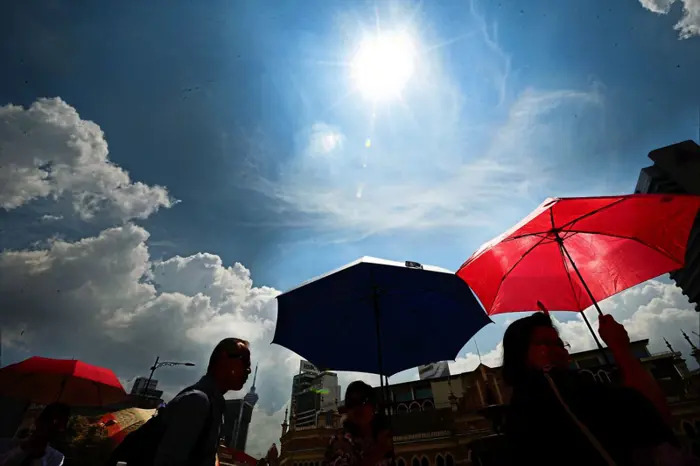
Unbearable: There’s usually a sea of umbrellas in Kuala Lumpur nowadays as tourists try to protect themselves from the scorching sun. — AZHAR MAHFOF/The Star
MOST Malaysians are quite aware about the importance of preserving the environment and the need for sustainability. We’re familiar with climate change but oblivious to how it affects our daily lives. That indifference is about to dramatically change, though.
Unpredictable heavy rain and almost neverending heatwaves are now battering us daily, along with an increasing frequency of droughts and floods.
We’re now facing a spike in temperature earlier in the day, followed by thunderstorms, lightning, and downpours in the evenings.
The wet season is usually ushered in by the yearend monsoon, while the mercury rises around February, during the Chinese New Year period. That was how it used to be.
On March 21 this year, Pokok Sena, Kedah, recorded the highest temperature, 39.3°C, which is only slightly below the all-time high anomaly of 40.1°C recorded in Chuping, Perlis, in 1998.
Since that month, several Asean countries have experienced record-breaking temperatures with the devastating consequence of leaving people dead.
In the Philippines, it hit 53°C in Iba City; 48°C in Myanmar (in the Magway region); and 47°C in Vientiane. The Star reported that Bangkok, notorious for its heat, registered 52°C at the end of April.
And Reuters reported the heatwave in Saudi Arabia that was blamed for the deaths of 1,300 people on the Haj pilgrimage this month was made worse by climate change, according to a team of European scientists.
“Temperatures along the route from June 16 to 18 reached 47°C at times and exceeded 51.8°C at Mecca’s Great Mosque.”
Just last week, I spent five days in Hangzhou and Shanghai. Even though it’s already summer, it rained heavily daily. China, especially its southern part, has reported unusually heavy amounts of rain over the last few days.
This is all unprecedented, even for those of us who live in Asean countries where we are accustomed to warm weather – even we are finding the prolonged heatwave unbearable.
The heatwave has been attributed to a combination of causes including climate change and the El Nino weather cycle, during which warmer Pacific Ocean surface temperatures release more heat into the atmosphere.
Whether we like it or not, Earth has now entered the global boiling phase. Yes, we have passed the global warming stage, and it was an official declaration by the United Nations last year.
It was reported that April this year was the warmest month ever in the world after marking 11 consecutive months of unprecedented global temperatures, according to scientists.
But it’s no longer a matter of mere discomfort. The Star columnist Mangai Balasegaram wrote that the global mean temperature increased by more than 1.5°C – the critical threshold which scientists say we shouldn’t exceed to prevent catastrophic climate change.
Quoting the World Meteorological Organisation’s latest report, she wrote that Asia is heating up faster than the global average – almost doubling since the 1961-1990 period, with the report describing Asia as the “most disaster-hit region” from weather and climate hazards in 2023. Many countries here experienced a “barrage of extreme conditions, from droughts and heatwaves to floods and storms”.
Malaysia is projected to experience 200 heatwave days a year by 2050, with more extreme floods and thunderstorms, added Mangai, who writes on health issues monthly in StarLifestyle.
This shouldn’t be the concern of just government and non-governmental organisations. It needs to involve parents, schools, and places of worship in instilling the need to preserve our planet.
The Malaysian media also needs to provide regular, dedicated space to environment and conservation stories.
It’s great that environmental, social and governance (ESG) investment has become a requirement for public listed companies, and heartening that more have realised it should no longer be about mere compliance.
Scoring well on responsibility metrics and standards are potential investments for companies. Younger shareholders and customers also take ESG seriously because they want to be associated with and support companies that embrace the standards as their company’s statement and stand.
We need comprehensive policies and laws, as well as proper enforcement with strict priorities – otherwise the best laws would amount to very little.
No one will be spared, as we will be affected by health issues, food production challenges, and lower work productivity much more than we realise.
Malaysians, like the rest of the world, will face the heat, literally. It has already hit us, and it will get hotter. There’s nothing left to boil over because we have now officially entered the stage of Global Boiling.





